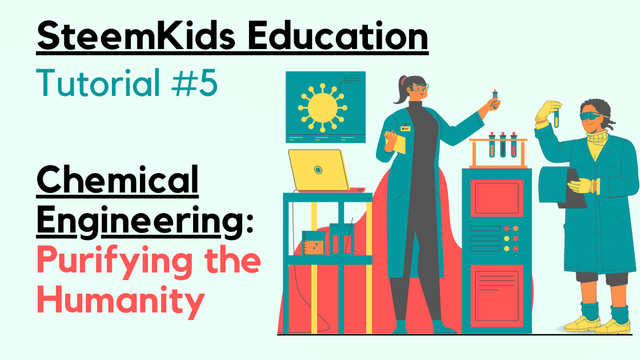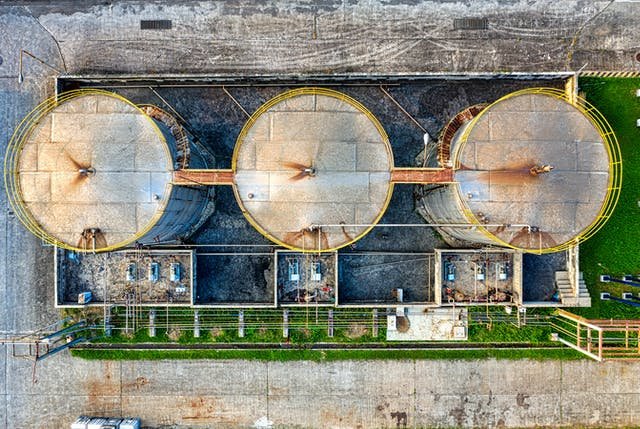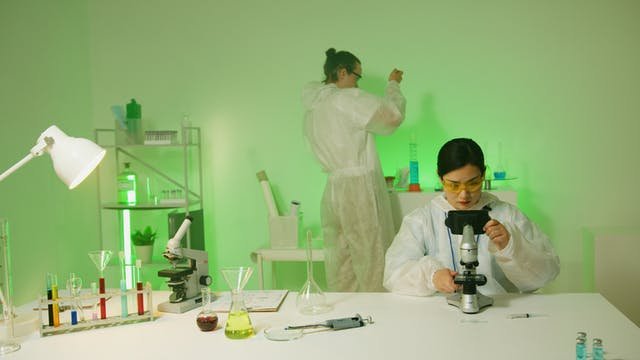Chemical Engineering - Purifying the Humanity - Steemkidss Engineering Course Introduction, Season 1: Tutorial 5 by @cryptogecko

Namaste Steem Family, and my greetings to all my students who attend my lessons.
During the last lesson, you learned about the Electrical engineering branch of engineering, which has had a huge impact on human history since its creation. Today, we are going to cover the chemical branch of engineering in this lesson.
Now let us get started.
Introduction
The role played by matter in the evolution of our universe is without a doubt one of the most fundamental ones.
In addition to the fact that there are a variety of ways in which matter can be studied, one of these methods is through the study of chemistry. Chemical engineering, on the other hand, is concerned with applying that knowledge in order to solve problems in a practical way.
As a chemical engineer, there are many areas of focus, which include, among other things, the development and design of factories and processes that are used to manufacture chemicals, which are essential for making everything that we use in our daily lives.
Think about a scenario where we have developed a brand new chemical process that can be used to manufacture a brand new product.
It may be as simple as a water purifier, a makeup product that lasts as long as the user wants it to last, or it could be as complicated as the development of a fabric that lasts exceptionally long for clothing.
Upon the completion of the design of our product, we will need to construct a facility that will allow us to manufacture the product once the design of our product has been completed. To be able to understand how to do that and how to do it successfully, it would be helpful to understand a bit about the history of chemical engineering so that you have a better understanding of how to do it.

Let us first of all address one of the most common misconceptions about chemical engineering that can be found around the world. The idea that chemical engineering is simply a matter of using chemistry to solve different problems encountered in engineering is a misconception that has spread over the years.
Despite the fact that chemical engineering involves a significant portion of chemistry, the engineering side is doing the real work and answering the real questions, such as:
- What can we do with these chemicals?
- How can we make them?
- How can we use them to make them?
- What is our best course of action and what lies ahead?
History of Chemical Engineering
The origins of chemical engineering can be traced to the American Revolutionary War, which had an unofficial beginning.
As a result of the war, blockades were erected between the American colonies and Europe in order to prevent commerce from taking place. France was particularly affected by these blockades because it acquired most of its supply of sodium carbonate from America, which is what is commonly known as soda ash, due to these blockades. A huge variety of purposes was once used for soda ash, such as use in cooking, in the manufacture of glass and paper, and in the manufacture of soap in the past.
In 1775, the French Royal Academy offered a prize to the person who could produce sodium carbonate from sodium chloride, which is also known as common salt, in order to circumvent the problem that France was unable to obtain sodium carbonate by its normal trade routes. The goal was finally achieved approximately 15 years later by the French chemist and physician Nicolas Leblanc, who has been working on this project for years. As a result of his methods, now known as the Leblanc Process, sodium chloride was first heated with sulfuric acid to create sodium sulfate, which was commonly known as salt cake when it was first heated with sulfuric acid.

The salt cake was also combined with crushed limestone and coal, and the mixture was then fired, after which the whole mixture was molten and combusted. This resulted in the formation of a mixture of sodium carbonate and calcium sulfide, which is also known as black ash as a result of the process. Sodium carbonate was separated from the black ash by washing it with water and evaporating it in order to separate it from the sodium carbonate.
In order to describe this extraction process, we use the term lixiviation, which is an acronym for liquid extraction. With Leblanc's invention, it became possible for chemical engineers to manufacture modern chemicals and opened up a whole new world for them. In 1791, he opened a small factory in Saint Denis in order to produce soda ash on a large scale, which led to the development of the industry.
His plant was taken over by revolutionaries as part of the French Revolution, and as a result, his trade secrets were also released by them. Although it was revolutionary in its own right, this process was extremely harmful to the environment, no matter how revolutionary it was in its own right. During the course of the project, a large amount of waste was generated, which gave off an unpleasant odor.
It is often the case that governments are able to pass laws in order to control pollution, especially around large cities and bodies of water, due to the fact that chemical processes frequently produce nasty byproducts. In spite of all of these factors, however, the chemical industry has not been hindered by any of these factors in its growth. As a result of the Leblanc process, George Davis, a British chemist, worked for the Alkali Act, an early environmental legislation passed in response to the Leblanc process, and was an inspector for this act during the late 19th century.

In order to comply with this act, soda manufacturers were required to reduce the amount of hydrochloric acid gas they released into the atmosphere in order to comply with this law. It was in the early 1887s that Davis was invited to give a series of lectures at the Manchester School of Technology. As a result of his lectures, he wrote a two-volume textbook called the Handbook of Chemical Engineering, which was a pioneering work in the field.
Advancements in the Chemical Engineering
In fact, there had already been chemistry books written for specific industries, such as acid production and brewing, which were already published. It was the unique aspect of Davis' work that it arranged basic operations that are common to many industries, such as transporting liquids, gases, or distillation, that made Davis' work unique. His work contributed to the development of chemical engineering degrees at universities throughout the United States and stimulated a new approach to thinking about chemical processes throughout the country.
Our product is almost certainly going to be developed in collaboration with chemical engineers who have been educated in Davis' teachings in order for us to develop our product. It was not long before cars began to play an increasingly important role in every aspect of modern life as the 20th century approached. Chemical engineers played a significant role in the development of their use as early as the 19th century, by manufacturing gasoline within a short period of time.
The drilling for crude oil had already begun, but it was not gasoline that was being produced. It was necessary to refine the oil in order to make it usable. In order to solve this problem, refineries had to be constructed, which were in essence large chemical plants.

By introducing methods such as cracking into the production process of gasoline, chemical engineers were able to improve the process of making gasoline through the use of heat and pressure, which allowed the heavy hydrocarbon molecules to be broken down into lighter ones. Through the process of polymerization, propylene and butylene were converted into molecules with a molecular weight two or three times greater than their initial molecular weight. Due to the improved economic viability of gasoline, gas became cheaper and owning a car became more affordable.
A great deal of planning is required when producing large quantities of chemicals on a large scale. With the development of chemical plants, chemical engineering becomes increasingly concerned with what we will call "Unit Operations". In 1915, Arthur D. Little attempted to do this by dividing each component of a chemical plant into smaller units.
Would it be necessary to transport chemicals from one side of the facility to another? Pipes may be an appropriate solution. In this case, we are dealing with a unit. For the flow to be driven, pumps will be required. This is an additional unit. Interested in stimulating a reaction? It may be appropriate to use a reactor. What if you mixed those chemicals together? It may be advisable to use a mixer. Would it be necessary to separate them? The use of a distillation column or reverse osmosis membrane may be beneficial in this situation.
As a whole, they serve as units for illustrating the key theories that chemical engineers must understand in order to maintain a plant. However, it is equally important to break down our chemical plant into unit operations during the manufacturing phase despite the importance of considering processes as a whole. Engineers were able to become more creative in the way they manufactured chemicals when they realized that all of these processes were based on fundamental principles such as momentum transfer, mass transfer, and thermodynamics. A significant part of this result was attributed to Little's research.

It was no longer necessary to use the same equipment for the same limited purposes for which it had been designed. It was possible to devise new ways of using their tools and machines in order to achieve the desired result. Therefore, chemical engineering has developed into one of the most diverse fields in the field of engineering as a result of this development.
There was a much narrower scope to the field in the early 1970s than there is now, as a result of technological advances. It was estimated that roughly 80% of chemical engineers who graduated from college were employed by chemical process companies and by the government at the time. It is estimated that by the year 2000, that percentage had fallen from 80% to approximately 50%.
Boon for Humanity
The reason for this can be attributed to a number of factors, one of which is the emergence of biotechnology. It is important to emphasize that the field of biotechnology engineering is primarily concerned with the application of technology to biological systems and living organisms, which means that it involves research and development. The understanding of how and why biological processes function will help us to develop methods of changing, adapting, and controlling them in order to enhance our lives as much as possible.

Chemical engineers have also played an important role in expanding the scope of their work by working for pharmaceutical companies and healthcare companies. Each day, new medications and drugs are created and improved as a result of the efforts of the pharmaceutical industry. It is also the responsibility of chemical engineers to develop ways of delivering drugs into the human body through the use of innovative methods.
There may be times when it is best to inject a medication, such as insulin or EpiPen, whereas for others, it may be best to spray a medication, such as an inhaler. Many of the foods that we consume are also manufactured using chemical engineering technology, which is involved in the manufacturing process. The process of making corn syrup from corn and artificial sweeteners has been a challenge for us.
It is possible to produce vegan and vegetarian meats with the same taste as meat derived from animals by using dairy substitutes and plants. There has been a significant improvement in the lives of people who suffer from food allergies and dietary restrictions as a result of all of these factors. Additionally, chemical engineering is increasingly focused on sustainable energy and environmental issues.

In order to maintain what we already have as well as find new energy sources that will not run out of power, it is important that we maintain what we already have. Therefore, biomass can be seen as a renewable organic material that has been derived from plants and animals that is closely related to the field of chemical engineering. There are a variety of materials that can be used for this purpose, from wood and leftover crops to garbage and manure.
The United States Environmental Protection Agency (EPA) reports that biomass fuels account for about 5% of the country's primary energy consumption. Chemical engineers play a significant role in determining what can be used as biomass and how best to break it down for energy production. With the knowledge provided by all these developments in chemical engineering, we will be able to manufacture our wonderful new product.
Conclusion
You may be able to improve on what already exists, or you may be able to create something entirely new. When you are a creator, you are only limited by your imagination. As a result, we have learned a great deal about the history of chemical engineering, beginning with sodium carbonate, which was the precursor to chemical engineering.
After that, we discussed George Davis, considered to be the father of chemical engineering, and his teachings. With the help of the lesson, we were able to gain a deeper understanding of how oil refineries and chemical factories work, and how they are operated. Following the discussion of biotechnology, pharmaceuticals and food, as well as renewable energy, we ended our lesson by discussing the newest advancements in biotechnology, pharmaceuticals, and food that have come into being over the past few years.
What’s Next
In our next class lesson, we will be discussing the impact of industrial and biomedical engineering on the world as well as how these two fields are revolutionizing our lives.
Homework:
Explore one of the most recent innovations in the field of chemical engineering and present the details of this innovation to your peers.
Talk about past innovations in chemical engineering field that are really important for us humans.
Would you consider chemical engineering to be a field that you would be interested in studying? If so what are some of the aspects you find inspirational in chemical engineering?
Rules:
- You must be a verified kid (adults are also allowed)
- You must at least write 300 words.
- The post must not be plagiarized.
- Use the tags; #learnwithsteem #assignment #steemexclusive #engineering #country #clubstatus in your tags
I hope you liked this tutorial and please tell me in the comments, what you liked in this tutorial.
Beneficiaries of this post:
- @steemkidss: 10%
- @null: 25%
Hello @cryptogecko thank you for taking your time to teach our kids, I know it takes a lot of effort from you to create this post. But as a kind of suggestion please be a bit brief next time since your target audience are kids so that they will be able to read and comprehend what you teach them. Once again thanks 🙏 and keep it up with the good work 👍
As these are just introduction to the different fields of engineering, the content is written in a way that the kids and the adults who read this can take a better decision in choosing the field they want to explore when they start their college studies.
The length of the content is increased sometimes because it is my intention to describe the field properly to my readers and the intention is to make them understand what they can expect in the full course tutorials that are going to come at the later times.
And please check the voting CSI again, as I have not voted anybody in past few hours, and the number you have written here is too low than the number shown on the SteemWorld platform.
This is a typo I'll correct it right away